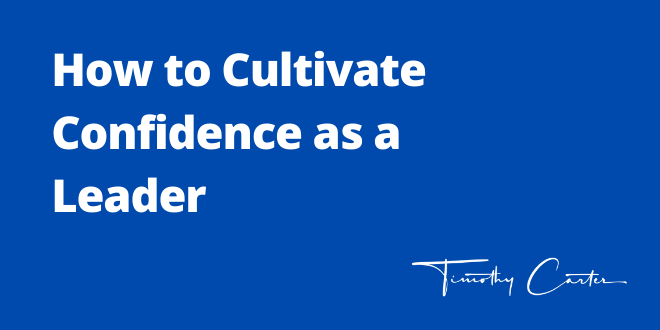
The Power of Embracing Challenge in Business
March 18, 2024
Unlocking Your Worth
March 19, 2024Confidence is one of your most important qualities as a leader. If you exhibit confidence, the rest of your team will have more faith in your decisions. They’ll be more likely to respect you and hear what you have to say. Additionally, you’ll be able to carry your confidence into negotiations, team meetings, client meetings and other interactions, ultimately giving you a tactical advantage.
The problem with confidence is that for many people, it doesn’t come naturally. You may not wake up in the morning feeling supremely confident the way some other people do.
But here’s an interesting little secret; some of the most confident people you’ve met weren’t naturally confident. Instead, they were faking it. Or maybe they trained themselves to be more confident. Or both.
If they can do it, you can do it. So let’s dig deeper. How can you cultivate more confidence as a leader?
1. Focus on what you do feel confident about
“Confidence” is a general term, but it applies to many individual actions and activities throughout the day. When delivering a pep talk in front of your team, you may not feel confident. But you may be perfectly confident solving a tough sudoku puzzle in the morning paper. Or you may feel confident about doing something simpler, like giving your drink order at the coffee shop before work.
In any case, there’s something you’re confident about, so focus on that. Pay close attention to this confidence, even if it blends in as part of the “white noise” of your normal routine. Dwell in this confidence. Focus on it. Chances are, this feeling will continue to resonate with you even as you complete other tasks.
2. Improve your environment
Next, consider improving your environment. We often don’t realize it, but our surroundings have a massive impact on how we feel about ourselves. Everything from the placement of your furniture to the color of your office walls can have an impact on your thoughts and feelings.
For example, if your office is small, dark, cramped and isolated from other employees, you might feel trapped, small and detached from your group. But if you have a brightly lit, colorful office with decorations you love and admire, you’ll feel much better about yourself. You can cultivate more confidence with a bigger space, a higher seating position, better visibility and access and of course, more things that suit your personal taste. Take the time to optimize your environment for your own confidence; you’ll likely notice a difference right away.
3. Practice the right poses
Our brains naturally connect our feelings to our body language. Most people understand this connection innately; when we feel happy, we smile, and when we’re angry, we frown. But it’s not common knowledge that this connection also works backward; smiling can actually “trick” your brain into feeling happier.
You can tap into this benefit by striking poses associated with confident, powerful people. For example, you can stand tall, chest lifted, with your hands on your hips. Or you can strike a superhero pose with your arms held high above your head. Do this in front of a mirror to make it even more powerful.
No matter which pose you choose, you’ll probably start feeling more confident immediately. Just make sure you’re practicing these poses somewhere other people won’t see you; you might look silly if one of your employees catches you in the act. (Good luck restoring your confidence from there.)
4. Fake it
We’ve all heard the advice to “fake it till you make it,” but did you know this is based on an empirically-backed scientific principle? The basic idea is that confidence (or any feeling, really) is based on a cluster of neurons firing together in sequence. Even if you’re simply simulating confidence, and not really subjectively “feeling” it, you’ll be training these neurons to fire together and building good habits that will eventually come naturally to you.
For example, let’s say you walk into a team meeting feeling nervous and shy. Instead, you power through and force yourself to appear confident; you hold good posture, you use a firm and stable voice, and you express certainty in the face of skepticism from your employees. The next time you’re in this situation, this pattern will come more naturally to you. It will be easier.
If you repeat this enough in an ample number of situations, eventually, you’ll start feeling more confident naturally.
Once you have more confidence as a leader, you’ll inspire more confidence and faith from your employees. You’ll be a more commanding presence in meetings. And you’ll win more negotiations and come out on top of disagreements. Eventually, these successes will reinforce your confidence even more -— and you’ll wonder what stopped you from feeling confident in the first place.
FAQ: Cultivating Confidence as a Leader
1. How can leaders identify specific areas where they lack confidence and work on improving them?
Identifying specific areas of confidence deficiency involves a blend of introspection and external feedback. Leaders can start by reflecting on situations where they feel uncertain or hesitant, noting recurring patterns. Seeking input from colleagues, mentors, or coaches can offer valuable perspectives and pinpoint areas for improvement.
2. Are there any psychological or cognitive techniques beyond posture and environment manipulation that can help leaders cultivate confidence?
Yes, beyond adjusting posture and environment, leaders can explore various cognitive and psychological techniques. These include cognitive-behavioral strategies such as cognitive restructuring to challenge negative thought patterns, visualization techniques for mental rehearsal, and mindfulness practices to enhance self-awareness and resilience. Additionally, seeking guidance from therapists or counselors can provide personalized support in building confidence and addressing underlying psychological barriers.
3. How can leaders balance the fine line between faking confidence and authenticity, ensuring they maintain genuine connections with their team while projecting confidence?
Balancing authenticity with projecting confidence requires self-awareness and empathy. Leaders can maintain authenticity by acknowledging vulnerabilities and being genuine in their interactions, while recognizing the importance of projecting confidence in certain situations. Finding this balance involves understanding when to express vulnerability and when to project confidence, adapting communication styles accordingly, and fostering open dialogue with team members to build trust and rapport.






